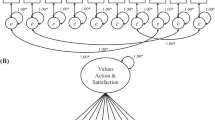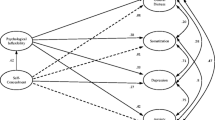Abstract
Acceptance and Commitment Therapy (ACT) is a counseling modality that features values clarification interventions. However, a well-established ACT-consistent measure of values for practitioners and researchers is lacking. The present study, therefore, examined an exploratory measure called the Valued Time and Difficulty Questionnaire (VTDQ; Wilson et al. 2010) and investigated the possible explanatory role of multiple ACT constructs on psychological distress. Obtained cross-national differences with a sample of 188 U.S. and 223 Japanese students were consistent with previous research. Moreover, a multiple mediator model revealed significant indirect effects of VTDQ subscale scores for time and difficulty on the association between culture and symptoms.

Similar content being viewed by others

References
Abe, J. A. (2004). Self-esteem, perception of relationships, and emotional distress: a cross-cultural study. Personal Relationships, 11(2), 231–247. https://doi.org/10.1111/j.1475-6811.2004.00080.x.
Arch, J. J., Wolitzky-Taylor, K. B., Eifert, G. H., & Craske, M. G. (2012). Longitudinal treatment mediation of traditional cognitive behavioral therapy and acceptance and commitment therapy for anxiety disorders. Behaviour Research and Therapy, 50(7–8), 469–478. https://doi.org/10.1016/j.brat.2012.04.007.
A-Tjak, J. L., Davis, M. L., Morina, N., Powers, M. B., Smits, J. J., & Emmelkamp, P. G. (2015). A meta-analysis of the efficacy of acceptance and commitment therapy for clinically relevant mental and physical health problems. Psychotherapy and Psychosomatics, 84(1), 30–36. https://doi.org/10.1159/000365764.
Baron, R. M., & Kenny, D. A. (1986). The moderator–mediator variable distinction in social psychological research: conceptual, strategic, and statistical considerations. Journal of Personality and Social Psychology, 51(6), 1173–1182. https://doi.org/10.1037/0022-3514.51.6.1173.
Bond, F. W., Hayes, S. C., Baer, R. A., Carpenter, K. M., Guenole, N., Orcutt, H. K., … & Zettle, R. D. (2011). Preliminary psychometric properties of the acceptance and action questionnaire–II: a revised measure of psychological inflexibility and experiential avoidance. Behavior Therapy, 42(4), 676–688. doi:https://doi.org/10.1016/j.beth.2011.03.007.
Chambless, D. L., & Klonsky, E. D. (2013). Compendium of empirically supported treatments. In G. P. Koocher, J. C. Norcross, B. A. Greene, G. P. Koocher, J. C. Norcross, & B. A. Greene (Eds.), Psychologists’ desk reference (pp. 159–166). New York: Oxford University Press. https://doi.org/10.1093/med:psych/9780199845491.003.0031.
Chambless, D. L., Crits-Christoph, P., Wampold, B. E., Norcross, J. C., Lambert, M. J., Bohart, C., & … Johannsen, B. E. (2006). What should be validated?. In J. C. Norcross, L. E. Beutler, R. F. Levant, J. C. Norcross, L. E. Beutler, R. F. Levant (Eds.), Evidence-based practices in mental health: Debate and dialogue on the fundamental questions (pp. 191–256). Washington, DC: American Psychological Association. doi:https://doi.org/10.1037/11265-005.
Chen, C., Lee, S. Y., & Stevenson, H. W. (1995). Response style and cross-cultural comparisons of rating scales among East Asian and North American students. Psychological Science, 6(3), 170–175.
Cheng, J. K. Y., & Sue, S. (2014). Addressing cultural and ethnic minority issues in the acceptance and mindfulness movement. In A. Masuda (Ed.), Mindfulness and acceptance in multicultural competency: A contextual approach to sociocultural diversity in theory and practice (pp. 21–37). Oakland: Context Press/New Harbinger Publications.
Cheng, D., Leong, F. T., & Geist, R. (1993). Cultural differences in psychological distress between Asian and Caucasian American college students. Journal of Multicultural Counseling and Development, 21(3), 182–190. https://doi.org/10.1002/j.2161-1912.1993.tb00598.x.
Dahl, J. C., Plumb, J. C., Stewart, I., & Lundgren, T. (2009). The art and science of valuing in psychotherapy: Helping clients discover, explore, and commit to valued action using acceptance and commitment therapy. Oakland: New Harbinger Publications.
Drake, C. E. (2017). VTDQ and AAQ cross-cultural comparison database. Retrieved from osf.io/ft7jh.
Drake, C. E., & Keusch, A. (2012). The assessment of valuing among undergraduates: Importance, time, difficulty, and anxiety. Presentation at the meeting for the Association for Behavior Analysis, Seattle.
Flaxman, P. E., & Bond, F. W. (2010). Worksite stress management training: moderated effects and clinical significance. Journal of Occupational Health Psychology, 15(4), 347–358. https://doi.org/10.1037/a0020522.
Goldberg, D. P. (1978). Manual of the general health questionnaire. Windsor: NFER Publishing Company.
Hayes, A. F., & Preacher, K. J. (2014). Statistical mediation analysis with a multicategorical independent variable. British Journal of Mathematical and Statistical Psychology, 67(3), 451–470. https://doi.org/10.1111/bmsp.12028.
Hayes, S. C., Wilson, K. G., Gifford, E. V., Follette, V. M., & Strosahl, K. (1996). Experiential avoidance and behavioral disorders: a functional dimensional approach to diagnosis and treatment. Journal of Consulting and Clinical Psychology, 64(6), 1152–1168. https://doi.org/10.1037/0022-006X.64.6.1152.
Hayes, S. C., Strosahl, K. D., Wilson, K. G., Bissett, R. T., Pistorello, J., Toarmino, D., … & McCurry, S. M. (2004). Measuring experiential avoidance: a preliminary test of a working model. The Psychological Record, 54(4), 553–578.
Hayes, S. C., Luoma, J. B., Bond, F. W., Masuda, A., & Lillis, J. (2006). Acceptance and commitment therapy: model, processes and outcomes. Behaviour Research and Therapy, 44(1), 1–25.
Hayes, S. C., Villatte, M., Levin, M., & Hildebrandt, M. (2011). Open, aware, and active: contextual approaches as an emerging trend in the behavioral and cognitive therapies. Annual Review of Clinical Psychology, 7141–168. doi:https://doi.org/10.1146/annurev-clinpsy-032210-104449.
Hayes, S. C., Strosahl, K. D., & Wilson, K. G. (2012). Acceptance and commitment therapy: The process and practice of mindful change. New York: Guilford Press.
Hill, C. E. (2012). Shopping around for theories for counseling psychology practice: reaction. The Counseling Psychologist, 40(7), 1061–1069. https://doi.org/10.1177/0011000012443289.
Iwawaki, S., Zax, M., & Mitsuoka, S. (1969). Extremity of response among Japanese and American children. Journal of Social Psychology, 79, 257–259.
Khan, J. A., & Cross, D. G. (1983). Mental health professional and client values: similar or different? Australian Journal of Sex, Marriage & Family, 4(2), 71–78.
Kinnier, R. T. (1995). A reconceptualization of values clarification: values conflict resolution. Journal of Counseling & Development, 74(1), 18–24. https://doi.org/10.1002/j.1556-6676.1995.tb01817.x.
Kirschenbaum, H. (2013). Values clarification in counseling and psychotherapy: Practical strategies for individual and group settings. New York: Oxford University Press. https://doi.org/10.1093/acprof:oso/9780199972130.001.0001.
Kishita, N., Tamamoto, T., & Shimada, H. (2008). Development of the Japanese version of the Acceptance and Action Questionnaire-II. Paper presented at the meeting of the Japanese Association of Health Psychology, Tokyo, Japan.
Levin, M. E., Hildebrandt, M. J., Lillis, J., & Hayes, S. C. (2012). The impact of treatment components suggested by the psychological flexibility model: a meta-analysis of laboratory-based component studies. Behavior Therapy, 43(4), 741–756. https://doi.org/10.1016/j.beth.2012.05.003.
Levin, M. E., MacLane, C., Daflos, S., Seeley, J. R., Hayes, S. C., Biglan, A., & Pistorello, J. (2014). Examining psychological inflexibility as a transdiagnostic process across psychological disorders. Journal of Contextual Behavioral Science, 3(3), 155–163. https://doi.org/10.1016/j.jcbs.2014.06.003.
Levin, M. E., Pistorello, J., Hayes, S. C., Seeley, J. R., & Levin, C. (2015). Feasibility of an acceptance and commitment therapy adjunctive web-based program for counseling centers. Journal of Counseling Psychology, 62(3), 529–536. https://doi.org/10.1037/cou0000083.
Markus, H. R., & Kitayama, S. (2010). Cultures and selves: a cycle of mutual constitution. Perspectives on Psychological Science, 5(4), 420–430. https://doi.org/10.1177/1745691610375557.
Masuda, A., Muto, T., Tully, E. C., Morgan, J., & Hill, M. L. (2014). Comparing Japanese college students’ and U.S. college students’ disordered eating, distress, and psychological inflexibility. Journal of Cross-Cultural Psychology, 45, 1161–1172.
Murdock, N. L., Duan, C., & Nilsson, J. E. (2012). Emerging approaches to counseling intervention: theory, research, practice, and training. The Counseling Psychologist, 40(7), 966–975. https://doi.org/10.1177/0011000012460663.
Muto, T., & Mitamura, T. (2015). Acceptance and commitment therapy for “Taro,” a Japanese client with chronic depression: a replicated treatment-evaluation. Pragmatic Case Studies in Psychotherapy, 11(2), 117–153.
Muto, T., Hayes, S. C., & Jeffcoat, T. (2011). The effectiveness of acceptance and commitment therapy bibliotherapy for enhancing the psychological health of Japanese college students living abroad. Behavior Therapy, 42(2), 323–335. https://doi.org/10.1016/j.beth.2010.08.009.
Myers, T. A. (2011). Goodbye, listwise deletion: presenting hot deck imputation as an easy and effective tool for handling missing data. Communication Methods and Measures, 5, 297–310. https://doi.org/10.1080/19312458.2011.624490.
Nakagawa, Y., & Daibo, I. (1985). Manual of the Japanese version of the general health questionnaire. Tokyo: Nihon Bunka Kagakusha.
Rolffs, J. L., Rogge, R. D., Wilson, K. G. (2016). Disentangling components of flexibility via the Hexaflex model: development and validation of the multidimensional psychological flexibility inventory (MPFI). Assessment, 1–25. doi:https://doi.org/10.1177/1073191116645905.
Sain, T., Primeaux, S., & Drake, C. E. (2016). I can’t get no valued action: exploring the valued action and satisfaction questionnaire. Presentation at the meeting for the association for contextual behavioral science, Seattle.
Schwartz, S. H. (1992). Universals in the content and structure of values: Theoretical advances and empirical tests in 20 countries. In M. P. Zanna (Ed.), Advances in experimental social psychology (Vol. 25, pp. 1–65). San Diego: Academic Press. https://doi.org/10.1016/S0065-2601(08)60281-6.
Shima, T., Yanagihara, M., Kawai, T., & Kumano, H. (2013). Validation of the Japanese version of the Acceptance and Action Questionnaire-II. Paper presented at the annual meeting of the Japanese Psychological Association, Tokyo, Japan.
Swain, J., Hancock, K., Hainsworth, C., & Bowman, J. (2013). Acceptance and commitment therapy in the treatment of anxiety: a systematic review. Clinical Psychology Review, 33(8), 965–978. https://doi.org/10.1016/j.cpr.2013.07.002.
VanBuskirk, K., West, L., Malcarne, V., Afari, N., Liu, L., Petkus, A., & Wetherell, J. L. (2012). Confirmatory factor analysis of the valued living questionnaire in a Black American sample: implications for cognitive research and practice. Cognitive Therapy and Research, 36(6), 796–805. https://doi.org/10.1007/s10608-011-9405-8.
Wilson, K. G., Sandoz, E. K., Kitchens, J., & Roberts, M. (2010). The valued living questionnaire: defining and measuring valued action within a behavioral framework. The Psychological Record, 60(2), 249–272.
Wolgast, M. (2014). What does the acceptance and action questionnaire (AAQ-II) really measure? Behavior Therapy, 45(6), 831–839. https://doi.org/10.1016/j.beth.2014.07.002.
Zettle, R. D., Rains, J. C., & Hayes, S. C. (2011). Processes of change in acceptance and commitment therapy and cognitive therapy for depression: a mediation reanalysis of Zettle and Rains. Behavior Modification, 35(3), 265–283. https://doi.org/10.1177/0145445511398344.
Author information
Authors and Affiliations
Corresponding author
Ethics declarations
Conflict of Interest
The authors declare that they have no conflict of interest.
Ethical Approval
All procedures performed in studies involving human participants were in accordance with the ethical standards of the institutional and/or national research committee and with the 1964 Helsinki declaration and its later amendments or comparable ethical standards.
Informed Consent
Informed consent was obtained from all individual participants included in the study.
Rights and permissions
About this article
Cite this article
Drake, C.E., Masuda, A., Dalsky, D. et al. Examining U.S. and Japanese College Students’ Differences in Psychological Distress: the Mediating Roles of Valued Action and Experiential Avoidance. Int J Adv Counselling 41, 25–40 (2019). https://doi.org/10.1007/s10447-018-9342-2
Published:
Issue Date:
DOI: https://doi.org/10.1007/s10447-018-9342-2



